Readings Newsletter
Become a Readings Member to make your shopping experience even easier.
Sign in or sign up for free!
You’re not far away from qualifying for FREE standard shipping within Australia
You’ve qualified for FREE standard shipping within Australia
The cart is loading…






This innovative study re-examines the dynamics of race relations in the post - Civil War South from an altogether fresh perspective: field sports.In the late nineteenth and early twentieth centuries, wealthy white men from Southern cities and the industrial North traveled to the hunting and fishing lodges of the old Confederacy - escaping from the office to socialize among like-minded peers. These sportsmen depended on local black guides who knew the land and fishing holes and could ensure a successful outing. For whites, the ability to hunt and fish freely and employ black laborers became a conspicuous display of their wealth and social standing.But hunting and fishing had been a way of life for all Southerners - blacks included - since colonial times. After the war, African Americans used their mastery of these sports to enter into market activities normally denied people of color, thereby becoming more economically independent from their white employers. Whites came to view black participation in hunting and fishing as a serious threat to the South’s labor system. Scott E. Giltner shows how African-American freedom developed in this racially tense environment - how a black sense of competence and authority flourished in a Jim Crow setting.Giltner’s thorough research in slave narratives, sportsmen’s recollections, records of fish and game clubs, and sporting periodicals offers a unique perspective on the African-American struggle for independence from the end of the Civil War to the 1920s.
$9.00 standard shipping within Australia
FREE standard shipping within Australia for orders over $100.00
Express & International shipping calculated at checkout
This innovative study re-examines the dynamics of race relations in the post - Civil War South from an altogether fresh perspective: field sports.In the late nineteenth and early twentieth centuries, wealthy white men from Southern cities and the industrial North traveled to the hunting and fishing lodges of the old Confederacy - escaping from the office to socialize among like-minded peers. These sportsmen depended on local black guides who knew the land and fishing holes and could ensure a successful outing. For whites, the ability to hunt and fish freely and employ black laborers became a conspicuous display of their wealth and social standing.But hunting and fishing had been a way of life for all Southerners - blacks included - since colonial times. After the war, African Americans used their mastery of these sports to enter into market activities normally denied people of color, thereby becoming more economically independent from their white employers. Whites came to view black participation in hunting and fishing as a serious threat to the South’s labor system. Scott E. Giltner shows how African-American freedom developed in this racially tense environment - how a black sense of competence and authority flourished in a Jim Crow setting.Giltner’s thorough research in slave narratives, sportsmen’s recollections, records of fish and game clubs, and sporting periodicals offers a unique perspective on the African-American struggle for independence from the end of the Civil War to the 1920s.